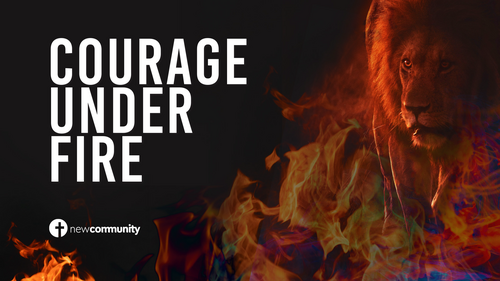
Courage Under Fire - Study 1
We are studying the book of Daniel because we want to observe how he embodied his faith convictions in a vastly different cultural setting.
- Pray: pause and ask God to speak to you as you read the story about Daniel.
- Read aloud Daniel 1:1-21. What initially jumps out at you regarding Daniel’s experience.
- Why did Daniel ‘draw a line’ and how did he seek to avoid eating and drinking the king’s food?
- Try and apply Daniel’s response to your own work or life setting. What are some of the tensions Daniel’s approach might create in your setting?
- Where is God in this story? Can you notice the three times God is mentioned? The word is the same but translated differently. It means: to give. What does this imply and how is this knowledge useful for our own setting?
- Can Christians differ on matters? If so, on what basis? Read Romans 14. Name the criteria Paul sets out as necessary regarding differing convictions within the Christian community.
Courage Under Fire - Study 2
We are studying the book of Daniel because we want to observe how he embodied his faith convictions in a vastly different cultural setting.
- Re-read the second chapter of Daniel. Discuss the aspects of the text that jump out at you.
- Consider how Daniel went about speaking to Arioch. What can you learn from his approach. Does this approach always work in our various settings?
- It was suggested on Sunday that fear can shrink faith as well as propel faith. Can you each name a time when you have experienced this?
- It was understood that the gods spoke through dreams. In the New Testament we routinely find God speaking to people through dreams. Have you experinced God speaking through a dream and if so, how did you know it was a “god” dream?
- Daniel’s prayer of “thanks” to God reflects a deeply held conviction: that his God was the God or all gods. How do we cultivate a sense of God’s “bigness” in our lives?
- Regarding spiritual growth, given we each have our own set of skills and abilities, how can we hold a healthy sense of our own achievements alongside our reliance upon God?
- Lastly, the statue! Many commentators have interpreted the various metals like this: Gold = Babylonian empire, Silver = Median/Persian empire, Bronze = Greek empire, Iron = Roman empire. Some have even likened the mixed clay/iron feet to represent modern day Europe, however this is rather speculative. However read 2:44 in light of Revelation 21:1-8. What is the unique Christian hope?
Courage Under Fire - Study 3
We are studying the book of Daniel because we want to observe how he embodied his faith convictions in a vastly different cultural setting.
Courage Under Fire - Study 4
We are studying the book of Daniel because we want to observe how he embodied his faith convictions in a vastly different cultural setting.
- A conviction is something you are thoroughly convinced of or fully persuaded about, it is more than personal preferences or subjective opinions; that result in actions. How have identified your convictions in the past? Where have your convictions been formed?
- We ought to have Strong convictions and gentle opinions. How do you tell the difference between convictions and opinions and how do you monitor the way your opinions are outworked in your life.
- What are some areas of opinion that we may need to climb down off our high horse?
- Read Dan. 6. Daniel stood on his conviction to worship only one God, this took courage. Where did Daniel's courage come from?
- Watch the clip of Frodo deciding to have courage. How does it help us stand on our convictions when we have others who share those convictions?
- To have courage under fire our convictions need to outweigh the costs. What might we do to increase the weight of our convictions? How might we reassess the weight of the costs?
- Jesus had courage under fire as he undertook the journey of the cross. How do we see his convictions outweigh the costs?
- Where do your convictions match or not match your behaviours. How might you close the gap between your convictions and your actions?
